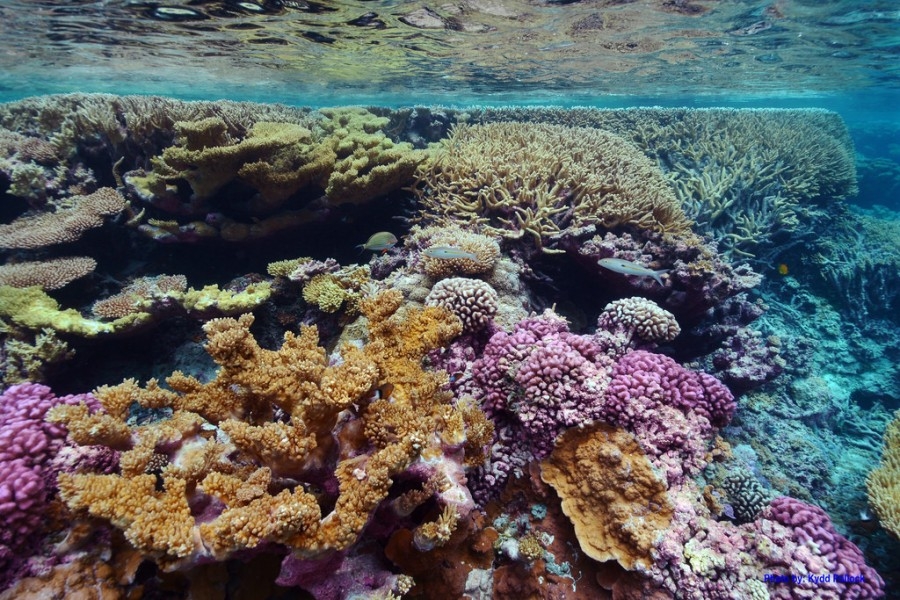
The National Science Foundation has awarded $366,000 to the School of Civil and Environmental Engineering's Kostas Konstantinidis for a study illuminating how microbes adapt to oceans that are becoming more acidic as a result of climate change.
As the amount of carbon dioxide in the atmosphere increases, the pH of seawater is dropping, but we still have relatively little understanding of how that affects the micro-organisms that are the backbone of the marine ecosystem.

Konstantinidis, working with colleagues from Duke University, will study how the microbes adapt to the greater acidity as well as other climate-change related streessors, such as high water temperatures. The work will help predict the broader consequences of ocean acidification on other marine life and fisheries as well as find areas that might be more vulnerable to the lower pH.
The researchers plan to turn their findings into learning modules on ocean acidification for K-12 students through and interactive museum display and an app for iPads.
Konstantinidis is the only Georgia Tech recipient in an $11.4 million batch of funding for ocean-acidification research. More about the grants from the NSF:
With increasing levels of carbon dioxide accumulating in the atmosphere and moving into marine ecosystems, the world's oceans are becoming more acidic.
The oceans may be acidifying faster today than at any time in the past 300 million years, scientists have found.
To address concerns for acidifying oceans, the National Science Foundation (NSF) has awarded new grants totaling $11.4 million through its Ocean Acidification program. The awards are supported by NSF's Directorates for Geosciences and Biological Sciences.
From tropical oceans to icy seas, the projects funded will foster research on the nature, extent and effects of ocean acidification on marine environments and organisms.
"The Ocean Acidification program at NSF has been wonderfully successful," says David Garrison, program director in NSF's Division of Ocean Sciences.
"We're seeing exciting results from earlier funding, and looking forward to similarly productive research from the current group of awardees."
Ocean acidification affects marine ecosystems, organisms' life histories, ocean food webs, and biogeochemical cycling, scientists have discovered.
Researchers believe there is a need to understand the chemistry of ocean acidification and its interplay with marine biochemical and physiological processes before Earth's seas become inhospitable to life as it is known today.
Animal species from pteropods--delicate, butterfly-like planktonic drifters--to hard corals are affected by ocean acidification. So, too, are the unseen microbes that fuel ocean productivity and influence the chemical functioning of ocean waters.
As the oceans become more acidic, the balance of molecules needed for shell-bearing organisms to manufacture shells and skeletons is altered.
The physiology of many marine species, from microbes to fish, may be affected. A myriad of chemical reactions and cycles are influenced by the pH, or acidity, of the oceans.
"Ocean acidification is an under-appreciated aspect of climate change, affecting the ecology of organisms and creating novel evolutionary pressures," says George Gilchrist, program director in NSF's Division of Environmental Biology.
"The integrated nature of these eco-evolutionary studies will provide new insights into how changes in ocean chemistry reshape populations and communities of marine organisms."
NSF Ocean Acidification grantees will ask such questions as: Will regional differences in marine chemistry and physics increase acidification? Are there complex interactions, cascades and bottlenecks that will emerge as the oceans acidify, and what are their ecosystem implications? And if current trends continue, how far-reaching will the changes be?
"This research on the physiological and metabolic responses of organisms to ocean acidification," says Irwin Forseth of NSF's Division of Integrative Organismal Systems, "is essential to our understanding of how these environmental changes will affect the structure and function of sensitive ecosystems worldwide."
(Photo Courtesy of the U.S. Fish and Wildlife Service via Flickr.)
